Our 4th and final workshop of INCLUDED Exploring Ways to Include People with a More Advanced Dementia as Co-Researchers through the Arts took place on Friday 10th November 2023.
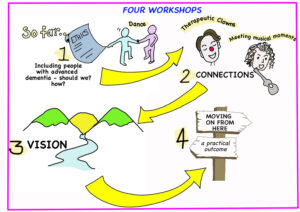 Once again, we were warmly welcomed by staff at the Edinburgh Training and Conference Centre and were well looked after by them for the whole day.
Once again, we were warmly welcomed by staff at the Edinburgh Training and Conference Centre and were well looked after by them for the whole day.
The purpose of this final workshop was to think about the practical next steps that we could take to develop our work in this project.
We reflected on how much more inclusive dementia research had come in recent decades as our perceptions of personhood, what it means to communicate and our ability to show agency had developed. This reflection brought with it a sense of hope and possibility as we thought about more developed philosophical understandings of what is possible in terms of people with advanced dementia being co-researchers as we continue to ask questions and challenge assumptions about how we traditionally communicate and understand each other.
At the heart of thinking about including people with a more advanced dementia as co-researchers, is knowing whether we can make meaningful connections with people who often don’t use verbal communication as their primary source of communication. Once we have a better understanding of whether these meaningful connections can be made, we can begin to think about how we might use those connections as a way of carrying out co-research with people with a more advanced dementia.
Frankie shared with us the findings of her PhD research that explored meaningful connections between people without dementia and those with advanced dementia. The findings showed the different practical ways and tools that people without dementia might use to help them make a meaningful connection. Significantly the findings suggest that there were certain approaches and attitudes of the person without dementia towards people with advanced dementia that appeared instrumental in making the meaningful connections happen.
The diagram below gives an overview of these approaches and attitudes, and also highlights what that tells us about the visible identity of the person with a more advanced dementia.
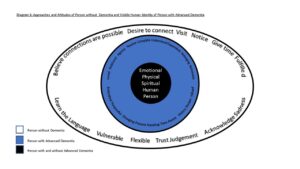
We reflected on what we had learned from Elderclown Suzy Ferguson and Musician Jane Bentley about the meaningful connections they make through their own art forms, and we discussed the various experiences that many of us who took part in this workshop have in making these connections.
The final session of the workshop was dedicated to thinking about how we could translate our learning, into a piece of research that would be appealing to funders and acceptable to ethics committees. It was clear that there are a number of steps that need to be taken before we can develop a research project with people living with advanced dementia as co-researchers, primarily around gathering evidence about how we can understand what is meaningful to people living with a more advanced dementia. We agreed that there is a wealth of knowledge and experience that exists in making meaningful connections and understanding what is meaningful for people with a more advanced dementia outside of academic research. This knowledge exists in carers, family members, friends, care staff, activities co-ordinators and many other people who have regular close contact with the person with advanced dementia. Importantly it exists within people living with a more advanced dementia.
As we discussed potential next steps a plethora of ideas emerged that centred around several key themes:
- Bringing together evidence of existing knowledge in one place that is accessible to those interested in this field of work, and that can be used to present to ethics committees and funders.
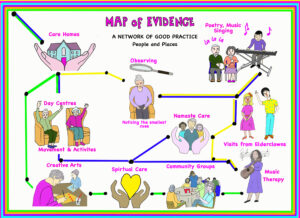
- Bridging the knowledge that exists in care settings and within academia about how we can understand what is meaningful to people with a more advanced dementia.
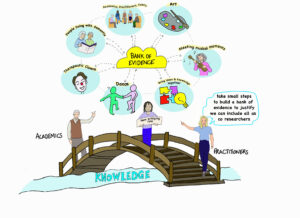
- Learning from the artistic practices of those who are skilled in attunement with people with a more advanced dementia, such as Elderclowns and specialist musicians.
- Regarding and working with all those who spend time with the person with a more advanced dementia as researchers and generators of knowledge on an equal footing, including the person with a more advanced dementia.
- Embedding academic researchers into a care home environment where they can observe and learn the nuances and ways in which individuals with a more advanced dementia communicate.
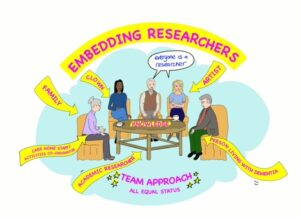
This series of workshops has significantly challenged current restrictive structures and process that exclude people living with a more advanced dementia as co-researchers. The learning and ideas that have emerged from our discussion has been inspiring and encouraging. The INCLUDED team will now spend some time reflecting on the workshops, learning and ideas and begin to develop a strategy for how we can continue to progress our journey of exploration into how we can include people with a more advanced dementia as co-researchers.


I love this idea, almost ethnographic in it’s approach ❤️ I look forward to seeing what the future brings ☺️
I’m responding to this: “At the heart of thinking about including people with a more advanced dementia as co-researchers, is knowing whether we can make meaningful connections with people who often don’t use verbal communication as their primary source of communication. Once we have a better understanding of whether these meaningful connections can be made, we can begin to think about how we might use those connections as a way of carrying out co-research with people with a more advanced dementia.” You might be interested in an evaluation tool, Quality of Life Movement Assessment for Persons with Advanced Dementia, that I developed that can be accessed here: https://static1.squarespace.com/static/5b3fc38145776e887e9666c4/t/5b70d962032be42d140dc929/1534122338958/QoL+Movement+Assessment.pdf . I developed this as a way of gathering research about people who can’t speak for themselves, but who clearly express their preferences and what is meaningful to them.
Thank you Donna, your evaluation tool looks really interesting. I have had a look through your website too, and the work that you do is inspiring!
Thank you, Frankie. I did a program for RFA in Montgomery, AL 2 weeks ago. The program coordinator said, “What an AMAZING demonstration that you gave us in the Respite class. We loved it so much. The energy and excitement was incredible and we will definitely be moving more. When we left for the day, our hearts were full.” My favorite moment was when a man who was not engaged responded to my kneeling down and looking into his eyes by allowing a slow, shy smile to spread over his face. Thank you for your work and for your research. If there is any way that I can participate with you from the U.S.. please let me know.